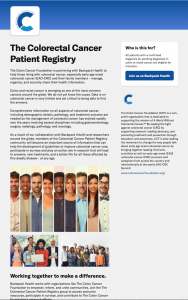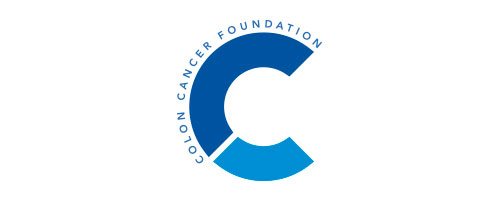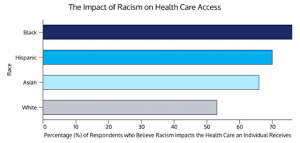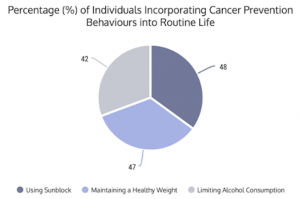Media Contact: Cindy Borassi
borassi@coloncancerfoundation.org
Portchester, N.Y., November 19, 2020— The Colon Cancer Foundation, a 501(c)3 non-profit organization, is pleased to announce a unique partnership with Backpack Health, a Konica Minolta Service, to launch The Colorectal Cancer Patient Registry. This partnership allows colorectal cancer patients to securely track and manage their health data through iOS, Android, and web-based tools that enable easy sharing of medical information with health care providers, caregivers, and researchers.
 Colorectal cancer patients need complex care to manage symptoms and eliminate the cancer from their body, often under the care of multiple specialists. Backpack Health’s secure mobile and web-based platform allows patients to streamline their medical information from different care providers, share with designated family members to improve care management, and reduce their burden of both managing health data and participating in research efforts to combat colorectal cancer.
Colorectal cancer patients need complex care to manage symptoms and eliminate the cancer from their body, often under the care of multiple specialists. Backpack Health’s secure mobile and web-based platform allows patients to streamline their medical information from different care providers, share with designated family members to improve care management, and reduce their burden of both managing health data and participating in research efforts to combat colorectal cancer.
“For people living with colorectal cancer, managing health information can feel like a full-time job. This partnership with Backpack Health will provide patients and caregivers a chance to have a stronger grasp on their diagnosis and treatment, which is really life-changing,” says Cindy Borassi, Interim President at the Colon Cancer Foundation.
By joining The Colorectal Cancer Patient Registry, Backpack Health users play an active role in their own care as well as research that can lead to newer treatments and improved quality of life for those affected by colorectal cancer.
The portable and concise nature of Backpack Health lends patients and their caregivers the flexibility of instant access to health records that can be readily shared with care teams via a Share Card. Additionally, the multilingual capabilities of Backpack Health’s platform can erase language barriers between health care providers, patients, and their loved ones.
“Backpack Health is excited to collaborate with The Colon Cancer Foundation, making it convenient and efficient for patients and their families to better manage and monitor their health, ” said Dr. Matthew Silva, Chief Executive Officer of Invicro and Board Member of Konica Minolta Precision Medicine. “We understand the importance and value to deliver useful and effective tools that can store, analyze, and share access to health records in real-time with providers and caregivers authorized by each patient.”
About the Colon Cancer Foundation
The Colon Cancer Foundation is a 501(c)3 non-profit organization registered in the state of New York and is listed by the IRS as a public charity. The organization is dedicated to supporting colorectal cancer research; educating the public about the importance of early detection, and forming strategic partnerships in the fight against colorectal cancer. The foundation offers those affected by colorectal cancer a platform to increase public awareness of colorectal cancer, while also working to lower incidence and death rates through public education, collaborations, and early-screening education. The Colon Cancer Foundation hosts annual events and challenges that seeks to raise money to support the foundation’s mission.
For more information please visit (www.coloncancerfoundation.org/) or connect with us on Instagram (www.instagram.com/coloncancerfoundation), Facebook (www.facebook.com/ColonCancerFoundation), or twitter (https://twitter.com/ColonCancerFdn).
About Backpack Health
Backpack Health, a Konica Minolta Service, builds secure, innovative information tools to help people manage their health journey — including wellness, illnesses, injuries, and chronic health conditions. The Backpack Health mission is to make it easy for everyone to access, own and control their health information to support better health care and attain better health for themselves, their loved ones and their communities. Backpack Health provides a platform for organizations to engage patients, collect up-to-date data and build communities around the globe. The platform also bridges patient connection and medical data gaps offering pharmaceutical sponsors data access to accelerate their drug development research and clinical trials for novel diseases. To assure data protection for its users’ information, Backpack Health complies with the EU General Data Protection Regulation (GDPR), adheres to its data protection principles, and participates in the EU-U.S. and Swiss-U.S. Privacy Shield Frameworks and the advice in the light of recent changes to these frameworks. Learn more at www.backpackhealth.com.
About Konica Minolta
Konica Minolta, Inc. (Konica Minolta) is a global digital technology company with core strengths in imaging and data analysis, optics, materials, and nano-fabrication. Through innovation, Konica Minolta creates products and digital solutions for the betterment of business and society—today and for generations to come. Across its Business Technologies, Healthcare, and Industrial-facing businesses, the company aspires to be an Integral Value Provider that applies the full range of its expertise to offer comprehensive solutions to the customer’s most pressing problems, works with the partners to ensure the solutions are sustainable, anticipates and addresses tomorrow’s issues, and tailors each solution to meet the unique and specific needs of its valued customers. Leveraging these capabilities, Konica Minolta contributes to productivity improvement and workflow change for its customers, and provides leading-edge service solutions in the IoT era. Headquartered in Tokyo and with operations in more than 50 countries, Konica Minolta has more than 43,000 employees serving approximately two million customers in over 150 countries. Konica Minolta is listed on the Tokyo Stock Exchange, (TSE4902). For further information, visit: https://www.konicaminolta.com/.



